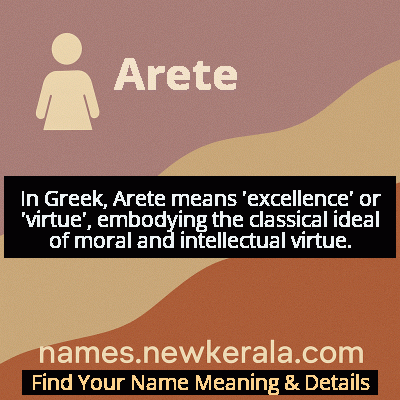Arete Name Meaning & Details
Origin, Popularity, Numerology Analysis & Name Meaning of Arete
Discover the origin, meaning, and cultural significance of the name ARETE. Delve into its historical roots and explore the lasting impact it has had on communities and traditions.
Name
Arete
Gender
Female
Origin
Greek
Lucky Number
4
Meaning of the Name - Arete
In Greek, Arete means 'excellence' or 'virtue', embodying the classical ideal of moral and intellectual virtue.
Arete - Complete Numerology Analysis
Your Numerology Number
Based on Pythagorean Numerology System
Ruling Planet
Uranus (Rahu)
Positive Nature
Strong sense of order, loyal, practical, and disciplined.
Negative Traits
Stubborn, overly serious, rigid, and prone to feeling restricted.
Lucky Colours
Blue, gray.
Lucky Days
Saturday.
Lucky Stones
Blue sapphire.
Harmony Numbers
1, 7, 8.
Best Suited Professions
Managers, engineers, accountants, organizers.
What People Like About You
Dependability, discipline, practicality.
Famous People Named Arete
Arete of Cyrene
Philosopher
Successor to her father Aristippus as head of the Cyrenaic school, taught philosophy for 35 years
Queen Arete
Mythological Queen
Wise ruler of the Phaeacians in Homer's Odyssey who helped Odysseus return home
Arete (daughter of Dionysius)
Scholar
Known for her education in mathematics and philosophy in 4th century BCE
Name Variations & International Equivalents
Click on blue names to explore their detailed meanings. Gray names with will be available soon.
Cultural & Historical Significance
Extended Personality Analysis
People named Arete typically embody the philosophical ideals associated with their name. They often display exceptional moral integrity and a natural inclination toward wisdom and learning. These individuals tend to be deep thinkers who value truth and authenticity in all aspects of life. Their personality is characterized by a balanced approach to challenges - they combine emotional intelligence with rational analysis. Arete personalities often serve as natural mentors and guides, offering thoughtful advice and demonstrating leadership through example rather than authority. They possess a quiet confidence that comes from self-awareness and continuous personal development. While they set high standards for themselves, they typically extend grace and understanding to others. Their pursuit of excellence is tempered by compassion, making them both achievers and nurturers. These traits make them particularly effective in roles requiring judgment, education, counseling, or leadership where moral character is paramount.
Modern Usage & Popularity
In contemporary naming practices, Arete remains an uncommon but deeply meaningful choice. Its usage is primarily among families with Greek heritage or those with strong interests in classical philosophy and literature. While the name doesn't rank in mainstream popularity charts, it has gained attention in academic circles and among parents seeking virtue names with historical depth. The modern Greek variation 'Areti' sees more frequent use in Greece and Cypriot communities. In recent years, there's been a slight uptick in usage as part of the trend toward unique, meaningful names that reflect parental values. Arete appeals particularly to parents who value education, moral development, and classical traditions. The name's rarity ensures it stands out while its profound meaning provides a meaningful foundation for a child's identity. Its usage patterns suggest it will remain a niche but respected choice among discerning parents.
Symbolic & Spiritual Meanings
Arete carries rich symbolic meanings that transcend its literal translation. It represents the human journey toward actualizing one's highest potential - the continuous pursuit of excellence in character, intellect, and action. Symbolically, Arete embodies the Greek ideal of kalokagathia, the unity of beauty and goodness, where outer excellence reflects inner virtue. The name symbolizes the philosophical concept that true happiness comes from living virtuously and fulfilling one's purpose. It represents the bridge between human potential and actual achievement, suggesting that excellence is not innate but cultivated through practice and wisdom. Arete also symbolizes the integration of various virtues - courage, wisdom, justice, and temperance - into a harmonious whole. In modern contexts, it represents the aspiration toward personal mastery and moral leadership in an increasingly complex world. The symbolic power of Arete lies in its reminder that human excellence is an ongoing pursuit rather than a final destination.

